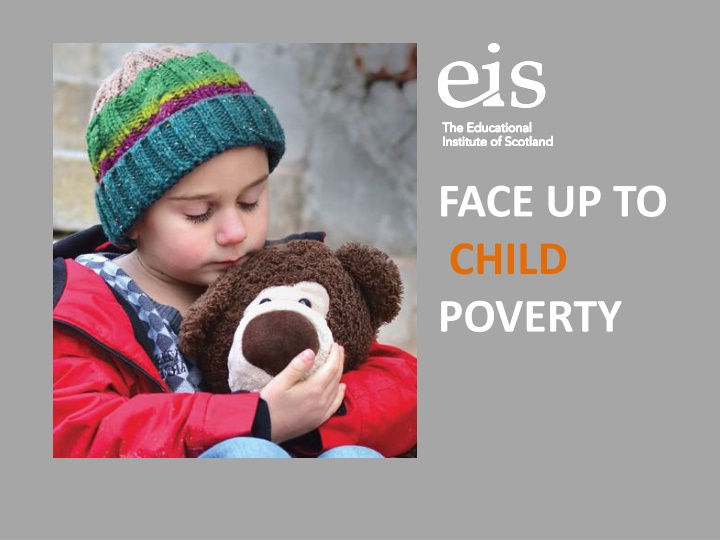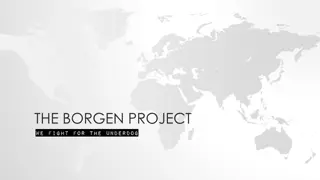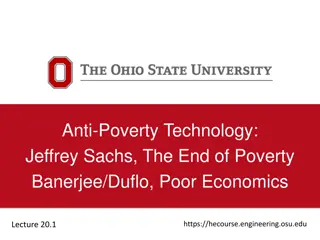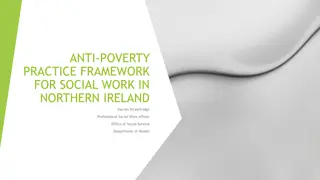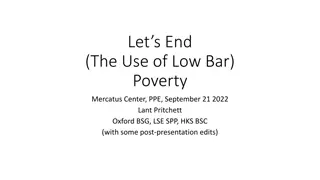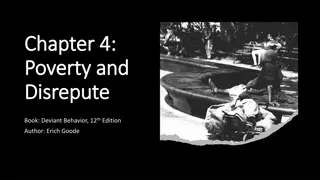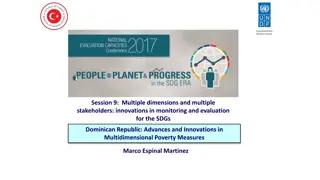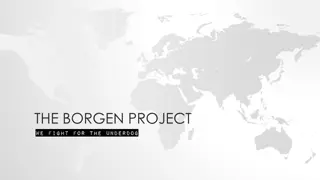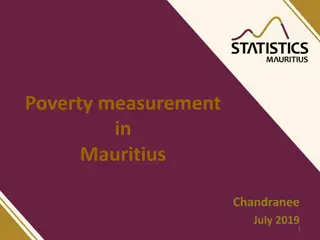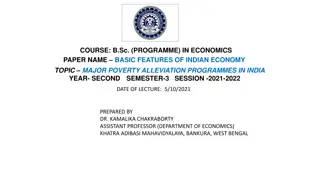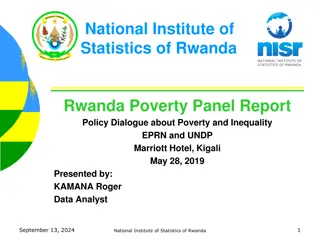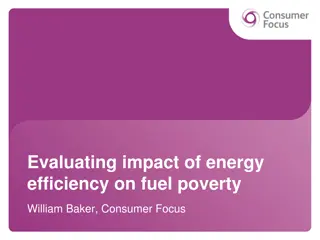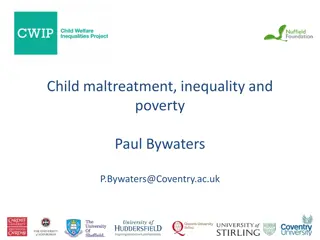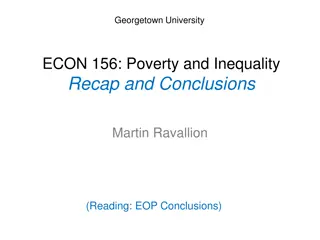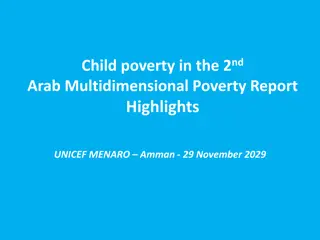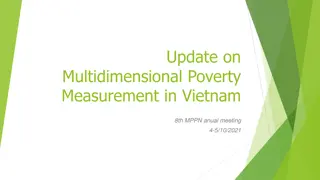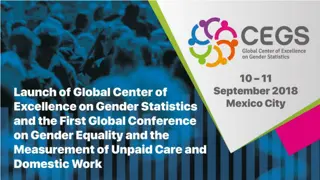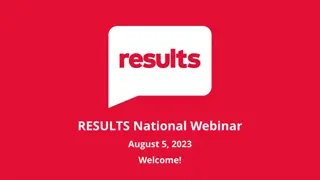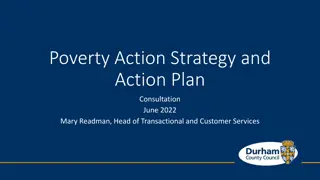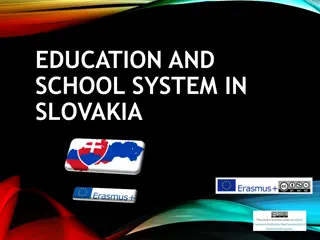Addressing Child Poverty in Schools: Strategies and Support
There is a concerning rise in child poverty impacting young students, with many attending school without proper breakfast. Glasgow, for instance, has one in two children living in poverty. To tackle this issue, schools are advised to be vigilant for signs of hunger in the classroom and implement whole-school approaches to address hunger and poverty. Measures include guidance on identifying hunger, referring families to support services, and poverty-proofing school uniform policies. By taking proactive steps and fostering a supportive environment, schools can help alleviate the challenges faced by children living in poverty.
Download Presentation

Please find below an Image/Link to download the presentation.
The content on the website is provided AS IS for your information and personal use only. It may not be sold, licensed, or shared on other websites without obtaining consent from the author.If you encounter any issues during the download, it is possible that the publisher has removed the file from their server.
You are allowed to download the files provided on this website for personal or commercial use, subject to the condition that they are used lawfully. All files are the property of their respective owners.
The content on the website is provided AS IS for your information and personal use only. It may not be sold, licensed, or shared on other websites without obtaining consent from the author.
E N D
Presentation Transcript
FACE UP TO CHILD POVERTY
We are seeing a huge rise in the number of young people coming in to school without having had a proper breakfast. In Glasgow, one child in two is now meeting at least one of the criteria that indicate they are living in poverty. Half of all the children in our largest city that is why we must act. Susan Quinn, Education Committee Convener
Hunger Advice to Members Be aware of signs of hunger in the classroom Act with sensitivity within established school protocols Raise the issue with the SMT as a matter of priority, with a view to agreeing a whole-school approach
Hunger : Poverty Proofing Whole school advice on how to make a referral when hunger is identified by a member of staff as a concern Children who may be at risk of hunger included within breakfast clubs (where they exist) Families referred to or advised of, outside agencies that can offer support-food-aid or advice on income maximisation Information about support displayed for all students, e.g. via school noticeboards, websites or PSHE lessons - this may reduce stigma and increase uptake
School Uniform Advice to Members Be aware of issues affecting low income families Seek consideration of cost in the application / revision of uniform policy Seek review of reward systems which take wearing of school uniform into account Raise the matter with the SMT
School Uniform : Poverty Proofing Calculating total cost of the required school uniform and weighing against the amount made available to families through clothing grants Considering ways uniform could be made less expensive for all families Appropriate responses to breaches of the uniform code that are likely to be linked to a child living in poverty
School Uniform : Poverty Proofing Setting up swap shops and other such systems can help, handled with tact - one approach may be to promote these as a form of environmentalism, thus challenging the stigma of second-hand clothing Recycling of lost property / items of uniform that have been outgrown or no longer needed by P7s or Secondary school leavers
...smart phones and tablets are items to which many family budgets simply cannot extend. Children are coming to school without the correct items for activities such as P.E. e.g. no gym shoes, shorts. This became even more noticeable as I have been delivering P.E. as NCCT for P1 to P7. I keep my own supply of lost, outgrown items which I happily allow children to share. One parent families with more than one child are trying to afford more than one change of shirt or top. Teachers anonymously provide these. Secondary Teacher, Falkirk Primary Teacher Aberdeen City
Equipment and Resources Advice to Members Make no assumptions about what families can afford Sensitivity of response to lack of equipment Take steps to fill the gaps where possible Ensure that activities are designed to be fully inclusive Seek revision of policy on supply of equipment / resources as necessary
Equipment and Resources : Poverty Proofing Classroom resources available on a daily basis for all children and young people to use Activities designed to involve resources that all pupils / students can access Non-punitive responses when children and young people come to class without the necessary resources as a possible consequence of their poverty.
Homework and Out of School Learning Advice to Members As far as possible, EIS members should: Ensure homework / out of school learning activities are fully inclusive with no associated cost Be sensitive to: home circumstances of children living in poverty limited access to parents time because of employment demands children and young people in the role of carers Show sensitivity in giving feedback on homework Ensure inclusivity in rewards systems that take homework into account
Homework and Out of School Learning: Poverty Proofing Opportunities to complete homework / out-of-class activities in school Internet / library access available to all pupils within the school day A range of homework activities, allowing pupils / students to opt in to those that they can access fully Packs of relevant materials and resources, including stationery, available for pupils
Homework and Out of School Learning: Poverty Proofing Active bags with maths and language games for pupils to play at home Avoidance of lesson plans wholly dependent on the previous completion of homework / out of school learning activities Review of homework policy to ensure relevance / necessity of tasks, giving consideration to the ability of all pupils to participate
Homework completion is affected by pupils not having a space to work, being carers, or looking after siblings. Secondary Teacher, Perth and Kinross We are facing another five years of austerity and our pupils are first in the firing line. I work in a very mixed comprehensive and an area of extreme concern is for the parents who are not part of the system e.g. families with one or two working parents who don t qualify for benefits. I recently ran a theatre trip and of the 50 pupils I took, six could not afford the 8 ticket (not including the pupils we knew would have to be subsidised). None of these pupils were your typical deprived pupil. All were high achieving, Higher candidates who were mortified at the thought of admitting that 8 was a big deal to their families. There must be thousands slipping through the net. Secondary Teacher, Glasgow Pupils are unable to go on the annual residential trip even though they are given a year to pay. Primary Teacher, South Ayrshire
School Trips Advice Raise the matter of cost and access in relation to planning, payment and running of outings Consider arrangements for the provision of food and snacks for the duration of trips out of school
School Trips : Poverty Proofing Special fund to cover the cost of school trips for pupils whose families cannot afford to pay Plenty of advance notice given of school trips so that families can plan for the associated cost Fundraising to cover the cost of trips Contacting local charities / employers that may be able to help Placing limits on spending money for all pupils
School Trips : Poverty Proofing Provision of spending money from a school fund to those who cannot otherwise afford to have it Agreeing policy on school trips which ensures that they are fully inclusive of all pupils / students
Children from poorer families dread non uniform days due to lack of good casual clothing knowing their peers will have this. Secondary Teacher, Falkirk ...many of the families who may be asked to donate to charity will themselves be in receipt of charity from food banks and other organisations.
Charity and Fundraising Activities Advice to Members Sensitivity to the growing financial struggles of families when requests are made for support in charity events Additional sensitivity in planning, communication, organisation and systems of reward Raise the matter with the management team within the school
Charity and fundraising: Poverty Proofing Consideration of the number of charity events per year Activities designed to include a range of ways that pupils can contribute, be recognised and valued Raising money beyond the family - supermarket bag packing, car washing, etc.
Recommended Action by EIS Members 1.Use Use this guidance as the basis of discussion on the issue of child poverty and education at EIS branch level. 2. Raise Raise any emerging issues with the school/college management team. 3. Seek Seek review of current school/college policies where required in light of this advice.
4. Consult Consult with the local EIS Equality Rep and / or the Local Association Secretary or FE Branch Rep in the event that additional advice / support is needed. 5. Continue Continue to monitor school policies and their potential to impact on children and young people living in poverty. 6. Share Share any examples of strongly inclusive practice which takes account of child poverty with the EIS Equality Department.
email: equality@eis.org.uk School Costs: weblink Face up to Child Poverty: weblink
